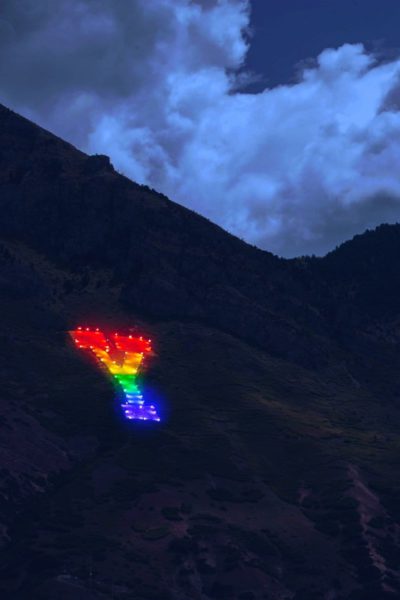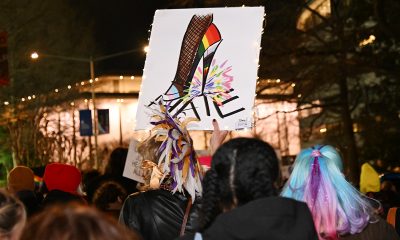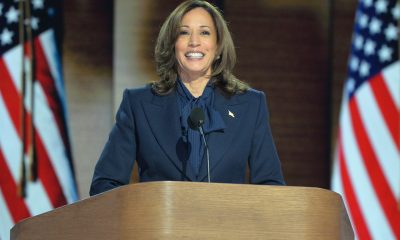Federal Government
Department of Education investigating BYU LGBTQ+ discipline policy
“They’ve wronged marginalized communities at BYU and they need to be held accountable for it” ~ former gay student at BYU

PROVO, Ut. – The U.S. Department of Education has opened an investigation into policies at Brigham Young University (BYU) that discipline LGBTQ students, aiming to determine whether or not the private religious school, owned by the Church of Jesus Christ of Latter-day Saints (LDS), is violating their civil rights.
The Education Department is investigating a complaint that came after BYU removed rules banning “homosexual activity” from its honor code in 2020, only to clarify weeks later that same-sex partnerships were still prohibited.
The probe, which opened in October of last year, will focus on Title IX, a law prohibiting universities from discriminating against students and others based on gender.
Last year, President Joe Biden signed an executive order mandating every federal agency, including the Education Department, clarify that civil rights laws protect LGBTQ people from discrimination. However, religious schools have Title IX exemptions, making federal scrutiny rare.
“It’s really significant that investigators are stepping in now,” Michael Austin, a BYU alumnus and vice president at the University of Evansville, told the Salt Lake Tribune. “It means there’s some reason to think the university has gone beyond the religious exemptions it has and is discriminating even beyond those.”
The investigation, headed by the Office of Civil Rights within the department, seems to be about whether faith-based exemptions apply even if the behavior is not directly related to education or expressly written in the honor code. BYU also bans alcohol, beards and piercings, among other things.
BYU did not respond to the Blade’s request for comment. But a spokesperson told the Associated Press that the school does not anticipate any further action because “BYU is exempt from application of Title IX rules that conflict with the religious tenets” of the LDS.
Though the LDS has softened some of its rules around LGBTQ issues, the church remains opposed to same-sex marriage and sex outside of marriage.
In a November 2021 letter to the Education Department, Kevin Worthen, president of BYU, argued that religious exemptions do apply to the school. The letter adds that all BYU students, faculty, administrators and staff “‘voluntarily commit to conduct their lives in accordance with the principles of the gospel of Jesus Christ.’”
The Department of Education responded to the letter, affirming that the university has some religious exemptions, but the department had to investigate if the complaint falls under those exemptions.
An Education Department spokesperson confirmed the investigation to the Blade but declined further comment.
Queer students at BYU celebrated the school’s removal of the anti-LGBTQ language in the honor code. Yet, the university announced weeks later that there was “some miscommunication” as to what the changes meant, clarifying that “the principles of the Honor Code remain the same.”
Bradley Talbot, a former gay student at BYU, was on campus during the apparent reversal, saying it “instilled a lot of fear and a lot of students.”
“There are still a lot of feelings of betrayal and apprehension around it,” he told the Blade.
At BYU, students who hold hands or kiss someone of the same sex can face punishment, including expulsion. LGBTQ+ students face harsher discipline than heterosexual couples at the school.
Talbot said he knew of “quite a few people” who lost their degrees and were kicked out during his time at BYU because of the gay dating ban. “People were turned in by roommates. Some people were turned in by their own parents,” he added.

The university’s clarification frustrated LGBTQ students, according to Talbot. In response, he organized a demonstration in March of 2021, lighting the “Y” that sits above BYU’s campus – one of the school’s oldest traditions – in rainbow Pride colors on the one year anniversary of the university’s letter sent to students that clarified the LGBTQ dating policy.
“We did it to reclaim that traumatic day and spin in a positive light of support, love and unity to create more visibility and awareness,” said Talbot. “And also to take a stand that we weren’t going to put up with just being tossed around by BYU. We deserve to be a part of the BYU community and a part of the LGBTQ community.”
The school has since updated its policies, banning protests and other demonstrations on Y Mountain, where Talbot staged his demonstration, in December of last year.
“Demonstrations should be consistent with BYU’s faith-based mission, intellectual environment and requirements described in the policy,” a statement added.
Still, Talbot, who is now graduated, has hope that the Education Department’s investigation will “finally change” things at BYU. “This has been something that’s been going on for decades,” he said. “They’ve wronged marginalized communities at BYU and they need to be held accountable for it.”
Federal Government
Holiday week brings setbacks for Trump-Vance trans agenda
Federal courts begin to deliver end-of-year responses to lawsuits involving federal transgender healthcare policy.

While many Americans took the week of Christmas to rest and relax, LGBTQ politics in the U.S. continued to shift. This week’s short recap of federal updates highlights two major blows to the Trump-Vance administration’s efforts to restrict gender-affirming care for minors.
19 states sue RFK Jr. to end gender-affirming care ban
New York Attorney General Letitia James announced on Tuesday that the NYAG’s office, along with 18 other states (and the District of Columbia), filed a lawsuit to stop U.S. Health and Human Services (HHS) Secretary Robert F. Kennedy Jr. from restricting gender-affirming care for minors.
In the press release, Attorney General James stressed that the push by the Trump-Vance administration’s crusade against the transgender community — specifically transgender youth — is a “clear overreach by the federal government” and relies on conservative and medically unvalidated practices to “punish providers who adhere to well-established, evidence-based care” that support gender-affirming care.
“At the core of this so-called declaration are real people: young people who need care, parents trying to support their children, and doctors who are simply following the best medical evidence available,” said Attorney General James. “Secretary Kennedy cannot unilaterally change medical standards by posting a document online, and no one should lose access to medically necessary health care because their federal government tried to interfere in decisions that belong in doctors’ offices. My office will always stand up for New Yorkers’ health, dignity, and right to make medical decisions free from intimidation.”
The lawsuit is a direct response to HHS’ Dec. 18 announcement that it will pursue regulatory changes that would make gender-affirming health care for transgender children more difficult, if not impossible, to access. It would also restrict federal funding for any hospital that does not comply with the directive. KFF, an independent source for health policy research, polling, and journalism, found that in 2023 federal funding covered nearly 45% of total spending on hospital care in the U.S.
The HHS directive stems directly from President Donald Trump’s Jan. 28 Executive Order, Protecting Children From Chemical and Surgical Mutilation, which formally establishes U.S. opposition to gender-affirming care and pledges to end federal funding for such treatments.
The American Medical Association, the nation’s largest and most influential physician organization, has repeatedly opposed measures like the one pushed by President Trump’s administration that restrict access to trans health care.
“The AMA supports public and private health insurance coverage for treatment of gender dysphoria and opposes the denial of health insurance based on sexual orientation or gender identity,” a statement on the AMA’s website reads. “Improving access to gender-affirming care is an important means of improving health outcomes for the transgender population.”
The lawsuit also names Oregon, Washington, California, Colorado, Connecticut, Delaware, the District of Columbia, Illinois, Maine, Maryland, Massachusetts, Michigan, Minnesota, New Mexico, Pennsylvania, Rhode Island, Vermont, and Wisconsin as having joined New York in the push against restricting gender-affirming care.
At the HHS news conference last Thursday, Jim O’Neill, deputy secretary of the department, asserted, “Men are men. Men can never become women. Women are women. Women can never become men.”
DOJ stopped from gaining health care records of trans youth
U.S. District Judge Cathy Bissoon blocked an attempt by the Department of Justice (DOJ) to gain “personally identifiable information about those minor transgender patients” from the University of Pittsburgh Medical Center (UPMC), saying the DOJ’s efforts “fly in the face of the Supreme Court.”
Journalist Chris Geidner originally reported the news on Dec. 25, highlighting that the Western District of Pennsylvania judge’s decision is a major blow to the Trump-Vance administration’s agenda to curtail transgender rights.
“[T]his Court joins the others in finding that the government’s demand for deeply private and personal patient information carries more than a whiff of ill intent,” Bissoon wrote in her ruling. “This is apparent from its rhetoric.”
Bissoon cited the DOJ’s “incendiary characterization” of trans youth care on the DOJ website as proof, which calls the practice politically motivated rather than medically sound and seeks to “…mutilate children in the service of a warped ideology.” This is despite the fact that a majority of gender-affirming care has nothing to do with surgery.
In United States v. Skrmetti, the Supreme Court ruled along party lines that states — namely Tennessee — have the right to pass legislation that can prohibit certain medical treatments for transgender minors, saying the law is not subject to heightened scrutiny under the Equal Protection Clause of the Fourteenth Amendment because it does not involve suspect categories like race, national origin, alienage, and religion, which would require the government to show the law serves a compelling interest and is narrowly tailored, sending decision-making power back to the states.
“The government cannot pick and choose the aspects of Skrmetti to honor, and which to ignore,” Judge Bissoon added.
The government argued unsuccessfully that the parents of the children whose records would have been made available to the DOJ “lacked standing” because the subpoena was directed at UPMC and that they did not respond in a timely manner. Bissoon rejected the timeliness argument in particular as “disingenuous.”
Bissoon, who was nominated to the bench by then-President Obama, is at least the fourth judge to reject the DOJ’s attempted intrusion into the health care of trans youth according to Geidner.
Federal Government
HHS ‘peer-reviewed’ report calls gender-affirming care for trans youth dangerous
Advocates denounce document as ‘sham science’

The U.S. Department of Health and Human Services on Nov. 19 released what it called an updated “peer reviewed” version of an earlier report claiming scientific evidence shows that gender-affirming care or treatment for juveniles that attempts to change their gender is harmful and presents a danger to “vulnerable children.”
“The report, released through the Office of the Assistant Secretary of Health, finds that the harms from sex-rejecting procedures — including puberty blockers, cross-sex hormones, and surgical operations — are significant, long term, and too often ignored or inadequately tracked,” according to a statement released by HHS announcing the release of the report.
“The American Medical Association and the American Academy of Pediatrics peddled the lie that chemical and surgical sex-rejecting procedures could be good for children,” said HHS Secretary Robert F. Kennedy Jr. in the HHS statement, “They betrayed their oath to first do no harm, and their so-called ‘gender affirming care’ has inflicted lasting physical and psychological damage on vulnerable young people,” Kennedy says in the statement.
The national LGBTQ advocacy organizations Human Rights Campaign and GLAAD issued statements on the same day the HHS report was released, denouncing it as a sham based on fake science and politics.
HRC called the report “a politically motivated document filled with outright lies and misinformation.”
In its own statement released on the same day the HHS report was released, HRC said HHS’s so-called peer reviewed report is similar to an earlier HHS report released in May that had a “predetermined outcome dictated by grossly uninformed political actors that have deliberately mischaracterized health care for transgender youth despite the uniform, science backed conclusion of the American medical and mental health experts to the contrary.”
The HRC statement adds, “Trans people’s health care is delivered in age-appropriate, evidence-based ways, and decisions to provide care are made in consultation with doctors and parents, just like health care for all other people.”
In a separate statement, GLAAD CEO Sarah Kate Ellis called the HHS report a form of “discredited junk science.” She added the report makes claims that are “grossly misleading and in direct contrast to the recommendations of every leading health authority in the world … This report amounts to nothing more than forcing the same discredited idea of conversion therapy that ripped families apart and harmed gay, lesbian, and bisexual young people for decades.”
In its statement announcing the release of its report, HHS insists its own experts rather than those cited by its critics are the ones invoking true science.
“Before submitting its report for peer review, HHS commissioned the most comprehensive study to date of the scientific evidence and clinical practices surrounding the treatment of children and adolescents for ‘gender dysphoria,’” the statement continues. “The authors were drawn from disciplines and professional backgrounds spanning medicine, bioethics, psychology, and philosophy.”
In a concluding comment in the HHS statement, Assistant Secretary for Health Brian Christine says, “Our report is an urgent wake-up call to doctors and parents about the clear dangers of trying to turn girls into boys and vice versa.”

President Donald Trump on Wednesday signed a bill that reopens the federal government.
Six Democrats — U.S. Reps. Jared Golden (D-Maine), Marie Gluesenkamp Perez (D-Wash.), Adam Gray (D-Calif.), Don Davis (D-N.C.), Henry Cuellar (D-Texas), and Tom Suozzi (D-N.Y.) — voted for the funding bill that passed in the U.S. House of Representatives. Two Republicans — Thomas Massie (R-Ky.) and Greg Steube (R-Fla.) — opposed it.
The 43-day shutdown is over after eight Democratic senators gave in to Republicans’ push to roll back parts of the Affordable Care Act. According to CNBC, the average ACA recipient could see premiums more than double in 2026, and about one in 10 enrollees could lose a premium tax credit altogether.
These eight senators — U.S. Sens. Catherine Cortez Masto (D-Nev.), Dick Durbin (D-Ill.), John Fetterman (D-Pa.), Maggie Hassan (D-N.H.), Tim Kaine (D-Va.), Angus King (I-Maine), Jacky Rosen (D-Nev.), and Jeanne Shaheen (D-N.H.) — sided with Republicans to pass legislation reopening the government for a set number of days. They emphasized that their primary goal was to reopen the government, with discussions about ACA tax credits to continue afterward.
None of the senators who supported the deal are up for reelection.
King said on Sunday night that the Senate deal represents “a victory” because it gives Democrats “an opportunity” to extend ACA tax credits, now that Senate Republican leaders have agreed to hold a vote on the issue in December. (The House has not made any similar commitment.)
The government’s reopening also brought a win for Democrats’ other priorities: Arizona Congresswoman Adelita Grijalva was sworn in after a record-breaking delay in swearing in, eventually becoming the 218th signer of a discharge petition to release the Epstein files.
This story is being updated as more information becomes available.
-

 National5 days ago
National5 days agoWhat to watch for in 2026: midterms, Supreme Court, and more
-

 Opinions5 days ago
Opinions5 days agoA reminder that Jan. 6 was ‘textbook terrorism’
-

 Colombia5 days ago
Colombia5 days agoClaudia López criticizes Trump over threats against Colombian president
-

 District of Columbia4 days ago
District of Columbia4 days agoImperial Court of Washington drag group has ‘dissolved’




















